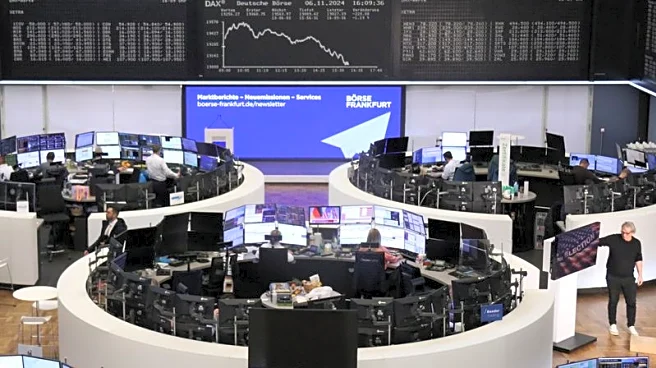What's Happening?
The Bank of Canada has highlighted the challenges posed by global trade disruptions in maintaining its 2% inflation target. Governor Tiff Macklem emphasized that these disruptions, exacerbated by geopolitical
tensions and shifts in global supply chains, could lead to increased inflation variability. The bank is focusing on risk management strategies to balance inflation control with economic growth. Despite a recent drop in inflation to a 40-month low of 2.5%, the bank acknowledges the difficulty in stabilizing both growth and inflation simultaneously, especially in a small, open economy like Canada that is heavily reliant on trade.
Why It's Important?
The implications of trade disruptions are significant for the U.S. and global economies. As countries like Canada face challenges in managing inflation due to supply chain issues, similar pressures could affect the U.S. economy, particularly in sectors dependent on international trade. The U.S. may experience increased costs for goods and services, impacting consumer prices and potentially leading to inflationary pressures. Businesses reliant on global supply chains might face operational challenges, affecting profitability and economic stability. The situation underscores the need for robust risk management and adaptive economic policies to navigate these uncertainties.
What's Next?
The Bank of Canada is updating its economic models to better handle periods of uncertainty, using more detailed data to understand the impacts of trade and industrial policies. This approach may serve as a model for other central banks, including the Federal Reserve, as they navigate similar challenges. The ongoing geopolitical tensions, particularly involving China, suggest that trade policies and supply chain strategies will remain critical areas of focus. Stakeholders, including policymakers and businesses, will need to adapt to these evolving dynamics to mitigate potential economic disruptions.
Beyond the Headlines
The broader implications of these trade disruptions extend beyond immediate economic concerns. They highlight the shifting landscape of global trade, where services are increasingly prioritized over goods, and geopolitical factors play a more significant role. This shift may lead to long-term changes in how countries approach trade agreements and economic partnerships. Additionally, the emphasis on risk management and adaptive strategies reflects a growing recognition of the interconnectedness of global economies and the need for collaborative solutions to address shared challenges.











